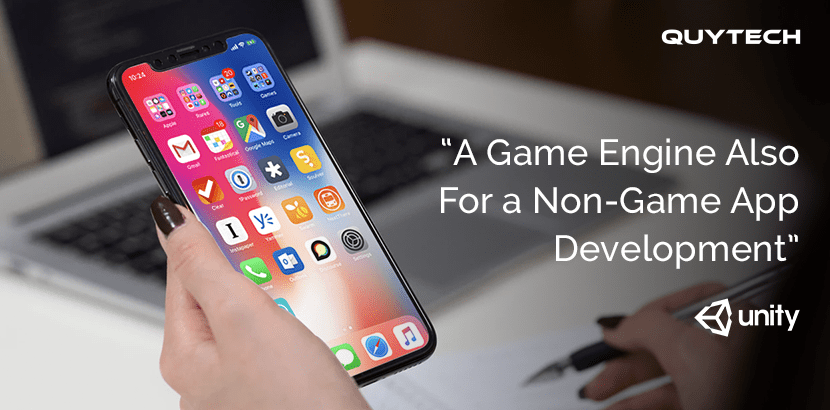The scenario of mobile app development has changed in the last few years.
The implementation of advanced tools and software is helping in exploring innovative possibilities. In-app market Unity apps are transforming the perspective of mobile development.
As a game engine is it also offers an integrated development environment to potential developers. Unity is primarily aimed at Unity game engine development is no more limited to games only.
There is no reason why the developers can’t use unity for app development to build a host of other tools, utilities, business apps, and a lot more. It is bringing pioneering games to Android, iOS, Windows, consoles, and many more platforms.
Streamlined interface, excellent versatility, and workflow with a rich array of features, it is currently the most popular game engine.
How can Unity3D be another platform in building non-game Applications?
Unity engine for developing games is famous because of its capability to target multiple platforms including mobile devices, web browsers, desktops, and consoles. Many developers prefer creating mobile games with unity for business applications that turn out to be amazing app.
Versatile Support
Unity is meant to develop a gaming app but it has additional features that allow developers to do it out of the box. As a game development company, we offers 3 languages C#, JavaScript, and Boo for the development of the mobile app.
It also allows integrating 2D, 3D, Videos, and Audio for better app development. Apart from that, it supports amazing animation tool API: Drozdz, 2010 to create any kind of complex logic of the development process.
Rapid Development
Unity makes non-game app development quicker and easier for developers. It supports C# rather than Java or Kotlin, which is considered a little simpler to get to grips with versus Java. It is helpful for the rapid development of the app. More important the IDE keeps the file structure of the Android app hidden. That means, there is no need to worry about things like the Android Manifest or resource folder. Developers familiar with C# can find this is much easier.
Supportive User Interface
Unity3d offers an intuitive and rapid user interface with drag and drop features. The developers don’t have to put effort into coding while developing non-gaming apps in games built in unity. When compared to an Android Studio, adding an image to a button or using a custom font in Unity is comparatively simple. Moreover, designing UIs in Unity doesn’t require any experience in XML.
For better performance, the Unity game engine offers speedy installation and setup. When it comes to testing and deploying apps, app development with Unity is extremely efficient and simple.
Cross Platform Development
The best part of Unity is that it comes up with a cross-platform tool. That means the app developers can easily create apps for Android, iOS, and Windows platforms. All a developer has to do is to make a few changes according to the platform the app is scheduled to release on.
Irrespective of the fact that tools like Xamarin have more advantages over Unity, still many developers are looking towards Unity app development to target broad audiences.
Influential Features
The majority of the features in the Unity engine are designed from the game development perspective. For mobile apps with 3D elements, Unity-based games have many powerful features that can help in the development. Moreover, there are many graphical features that can be used to add highly advanced 3D features to the app. Unity can also be a good choice to offer immersive effects to the app.
A quick guide to how to create non-gaming apps using Unity
Now when you trust that Unity 3D can be a useful tool to build mobile apps other than gaming, let’s take you on a quick tour of how to create the same:
- The first thing you have to do is to create a new 2D project. For this, access the Canvas available under the UI (GameObject). You have to use it as a primary view to create menus. To change the background colors, find the main camera from your hierarchy window. Add your first piece of text under GameObject -> UI -> Text.
- Now, scale to various device sizes. While doing so, ensure that your text is in the same position in all the devices.
- Start building interactivity
To know the detailed procedure of the same or to get a new mobile app developed using Unity3D, reach out to a reliable mobile app development company.
Types of Mobile Apps (Other than gaming) that can be developed using Unity
When it comes to developing a 3D application, there is no better platform than the Unity3D engine. Here are some of the options you can consider while using the technology for building a non-gaming application:
- Educational apps such as Shapes, Nano Simbox, 3D Bear AR and more
- Home Design apps such as Kavtek
- Marketing Apps such as Arilyn
- 3D modeling apps such as Grib
- Location-based apps to act as a personal assistant in big buildings such as airports
- Business apps
- Architecture apps
- Apps for industrial training
However, if you are looking out to build a native application, then it is recommended to use other app-focused technologies as well as development platforms.

Final thoughts
Unity3D with many possibilities can be used to create business applications with the help of frameworks and other assets. Unity3D offers solutions to the developers’ problems such as UI design, animation, and other complex problems.
Depending on the application that you want to build Unity can be used as your main platform. Despite having Cons, Unity is used by many mobile app development companies for better user engagement with 3D elements.
